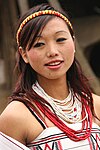Pochury Naga
They mostly live in the eastern part of the Phek district, centered at Meluri town (160 km from the state capital Kohima).[1] The word Pochury is an acronym formed by the names of three native villages of these people: Sapo, Kuchu and Kwiry.According to the Pochuri legends, these villages fought battles against each others, but united into a single ethnic group after their elders negotiated peace.[2] Besides the three main communities, migrants belonging to the Sangtam and Rengma people have also been absorbed in the Pochury group.The Pochury was accorded recognition as a distinct ethnic group based on political mobilization which included citing a pioneering ethnographic work in early 1980s (Das, 1994)7.[4][5] The exonyms used by other ethnic groups for the Pochury include:[2] In 1947 Christianity was first introduced to Shatiiza Village by Evangelist R.Sarie from Chakesang community.Sierhutho and Tassiatho, the eldest men from the Ngoru and Nyuwiri clans respectively, also had priest-like roles.The dialects includes Miiluori, Phorii, Yisi, Apoksha, Phongkhungri, Samburi [Sangtam] and Kuki.But Pochury been rich in all aspects have a great language diversity even among its people based on their origin.Many farming families are now above the Subsistence level thanks to the modern equipment, scientific techniques, irrigation channels, government subsidies and new crops."Yeshii" [in phorii] commonly known "YEMSHI" is an annual traditional festival celebrated by all the Pochuri communities.Among the Phor group of people, if a woman is divorced by her husband due to her adulterous act or thefts, no men from the village will marry her.Among the Meluri-Lephori group, though women, irrespective of age may be present during wild animal kills or a fish catch sharing, will be ranked at the bottom.Marriage can only happen after the boy attain maturity and has learnt to shoulder responsibilities during the time spent in the "MORUNG" (Men's dormitory, which acts as a learning institution).The Yisi group has a tradition that during a negotiation for final dowry, the girl's and boy's relatives will feast at their respective houses.It was also mandatory, in the Yisi group, for the bride to fetch either water or brine early the first morning at her new home after the marriage.If a young couples marry through elopement, their marriage can only be legalised by the village authority and the family concerned after performing ritual.Right after the engagement 5 (five) pieces of coins is to be paid to the girl's family as kükhayü which means the reservation fee.Another dowry, münüyü, consisting of either an adult pig or five to ten pieces of coins was paid by the boy's parent.It was mandatory for the bride's parent to give seeds, a dao, an axe, pots, baskets, necklaces, armlets, shawls etc.Meluri-Lephori group has a tradition that during marriage, 2 (two) dhaks of firewood of a local tree species known as Mütuseü were gifted to the girl by her parent.A cultivable plot of land known as Asuohzhuh by the Meluri, Phichü by the Phor-Yisi or Awayu by the Akhegwo was lent to the girl on marriage.Among the Phor group, if the wife commits adultery, her paramour has to pay a fine which consists of the best cultivable land.If the wife or her parent desires that they be remarried, they have to send her back and a plot of land known as Tsikhiyo is given as reparation.A divorced widow has the right to take back all the goods she brought with her during their marriage, including Asuohzhuh, Phichü or Awayu.If a widow has a male child and wishes to return to her parent or to remarry, she does not get any share of the moveable properties of her late husband.Among the Yisi group, after the birth of a child, both paternal and maternal parents would cook a meal and exchange it between themselves.A rich parent gifts their girl child with both moveable and immovable properties which are bought or earned by them.If a woman dies before her dowry has been fully paid, her mortal remains are claimed by her parents and buried at the family burial site.
Naga woman
NagalandPochuriChristianityAnimismNaga peopleethnic groupNortheast IndianPhek districtKohimaSangtamRengmaethnic groupsBritish administrationCensus of IndiaChakhru and KhezaSangtam NagasRengma NagasDimapuragricultureanimal husbandryforest producefishingjhum cultivationslash-and-burnterrace cultivationmithunbarter systemrice beermonogamypolygamyneolocalpatrilocalbride pricebuffalodivorceadulteryreaperbiblical namesshaving of headear piercingAdolescence ritualssacrificessorcerersPochury languageSubsistenceChristmasMorungAngamiChakhesangChotheKharamKhiamniunganKonyakLainongLamkangLiangmaiMakuryMaringMonsangPoumaiRongmeiTangkhulTangsaThangalTikhirWanchoYimkhiungHill tribes of Northeast IndiaMizoramChakmaDimasa (Kachari)HajongKhasi and JaintiaSynteng or PnarLyngngamKuki TribesMan (Tai speaking)Mizo (Lushai) tribesMikir (Karbi)Naga tribesPawi (Lai)Synteng (Pnar)YimkhiungNagaBodo-KachariMeghalayaKhasi Synteng or PnarLakher (Mara)Arunachal PradeshAbor (Galo)Aka (Hruso)ApataniDafla (Nyishi)GalongKhowa (Bugun)MishmiMiju MishmiChugpaLishipaSherdukpenSingpho (Jingpo)Tai peoplesKhamptiKhamyangKhambaMinyongMishing (Miri)PuroikZekhringManipurGangteKoirao (Thangal)KoirengSuhte (Paite)ThadouVaipheiTripuraBhutiaJamatiaKhasiaLepchaLushai (Mizo)Munda, KaurNoatiaSantalTripuriSikkim